Mises, Ludwig von. Human Action: A Treatise on Economics
Подождите немного. Документ загружается.

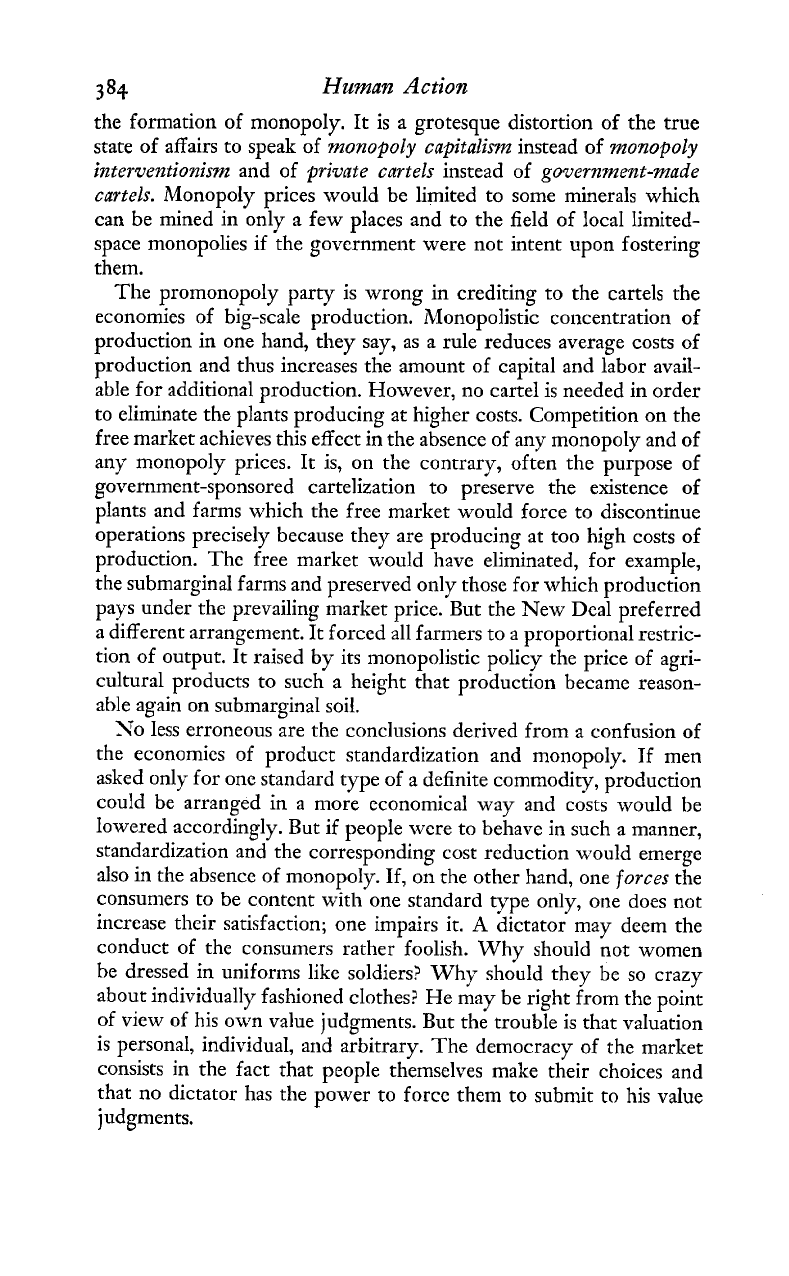
384
Human
Action
the formation of monopoly. It is a grotesque distortion of the true
state of affairs to speak of
monopoly capitalism
instead of
monopoly
interventionism
and of
private cartels
instead of
government-made
cartels.
Monopoly prices would be limited to some minerals which
can be mined in only a few places and to the field of local limited-
space monopolies if the government were not intent upon fostering
them.
The promonopoly party is wrong in crediting to the cartels the
economies of big-scale production. Monopolistic concentration of
production in one hand, they say, as a rule reduces average costs of
production and thus increases the amount of capital and labor avail-
able for additional production. However, no cartel is needed in order
to eliminate the plants producing at higher costs. Competition on the
free market achieves this effect in the absence of any monopoly and of
any monopoly prices. It is, on the contrary, often the purpose of
government-sponsored cartelization to preserve the existence of
plants and farms which the free market would force to discontinue
operations precisely because they are producing at too high costs of
production. The free market would have eliminated, for example,
the submarginal farms and preserved only those for which production
pays under the prevailing rnarket price. But the New Deal preferred
a different arrangement. It forced all farmers to a proportional restric-
tion of output. It raised by its monopolistic policy the price of agri-
cultural products to such a height that production became reason-
able again on submarginal soil.
No
less erroneous are the conclusions derived from a confusion of
the economies of product standardization and monopoly. Tf men
asked only for one standard type of a definite commodity, production
could be arranged in a more economical way and cdsts would
be
lowered accordingly. But if people were to behave in such a manner,
standardization and the corresponding cost reduction would emerge
also in the absence of monopoly. If, on the other hand, one
forces
the
consumers to be content with one standard type only, one does not
increase their satisfaction; one impairs
it.
A
dictator may deem the
conduct of the consumers rather foolish. Why should not women
be dressed in uniforms like soldiers? Why should they be so crazy
about individually fashioned clothes? He may be right from the point
of view of his own value judgments. But the trouble is that valuation
is personal, individual, and arbitrary. The democracy of the market
consists in the fact that people themselves make their choices and
that no dictator has the power to force them to submit to his value
judgments,
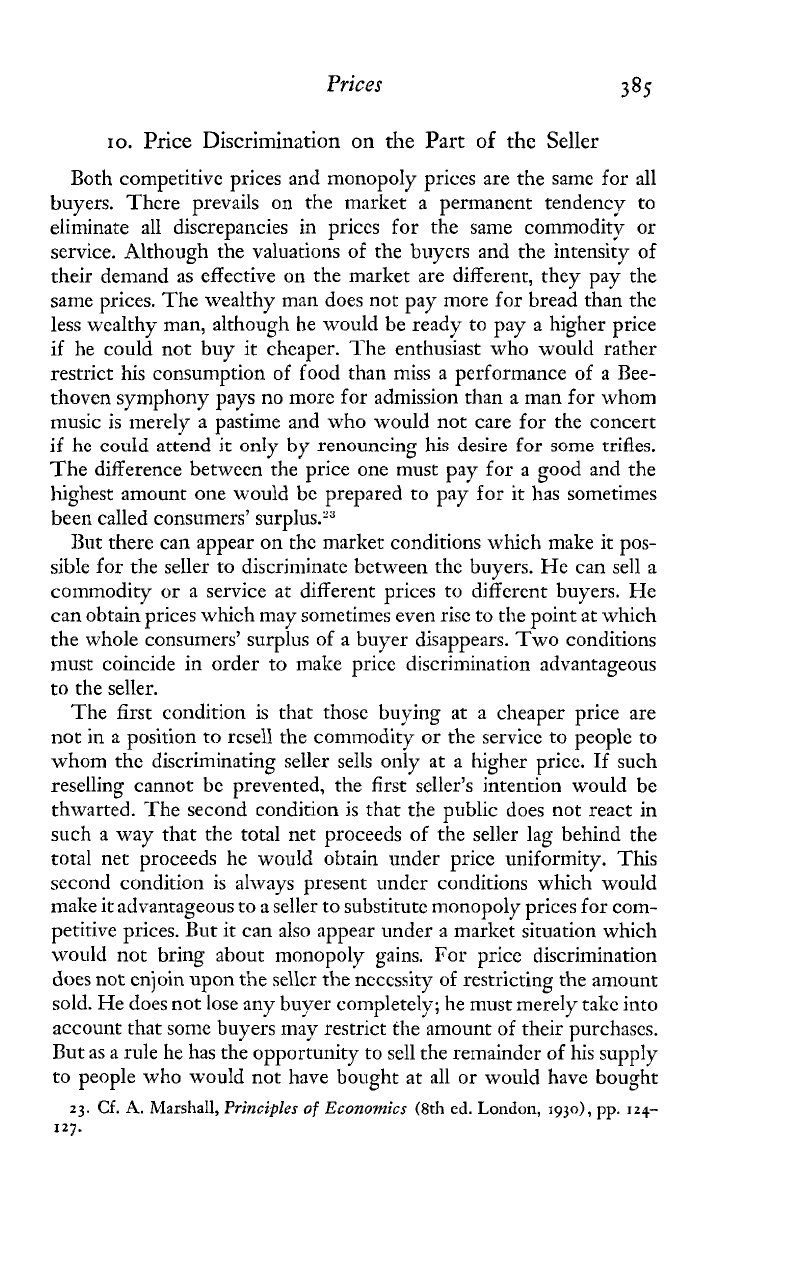
Prices
10.
Price Discrimination
on
the Part
of
the Seller
Both competitive prices and monopoly prices are the same for all
buyers. There prevails on the tnarket a permanent tendency to
eliminate all discrepancies in prices for the same commodity or
service. Although the valuations
of
the buyers and the intensity of
their demand as effective on the market are different, they pay the
same prices. The wealthy man does not pay more for bread than the
less wealthy man, although he would be ready to pay a higher price
if he could not buy it cheaper. The enthusiast who would rather
restrict his consumption of food than miss a performance of a Bee-
thoven symphony pays no more for admission than a man for whom
music is merely a pastime and who would not care for the concert
if he could attend it only by renouncing his desire for some trifles.
The difference between the price one must pay for a good and the
highest amount one would be prepared to pay for it has sometimes
been called consumers7
I3ut there can appear on the market conditions which make it pos-
sible for the seller to discriminate between the buyers. He can sell a
commodity
or a service at different prices to different buyers. He
can obtain prices which may sometimes even rise to the point at which
the whole consumers7 surplus of a buyer disappears. Two conditions
must coincide in order to make price discrimination advantageous
to the seller.
The first condition is that those buying at a cheaper price are
not
in
a position to resell the commodity or the service to people to
whom the discriminating seller sells only at a higher price. If such
reselling cannot be prevented, the first seller's intention would be
thwarted. The second condition is that the public does not react in
such a way that the total net proceeds of the seller lag behind the
total net proceeds he would obtain under price uniformity. This
second condition is always present under conditions which would
make it advantageous to a seller to substitute nlonopoly prices for com-
petitive prices. But it can also appear under a market situation which
would not bring about monopoly gains. For price discrimination
does not enjoin upon the seller the ncccssity of restricting the amount
sold. He does not lose any buyer completely; he must merely takc into
account that some buyers may restrict the amount of their purchases.
But as a rule he has the opportunity to sell the remainder of his supply
to people who would not have bought at all or would have bought
23.
Cf.
A.
MarshaI1,
Principles of Economics
(8th
ed.
London,
1g3o),
pp.
124-
127.
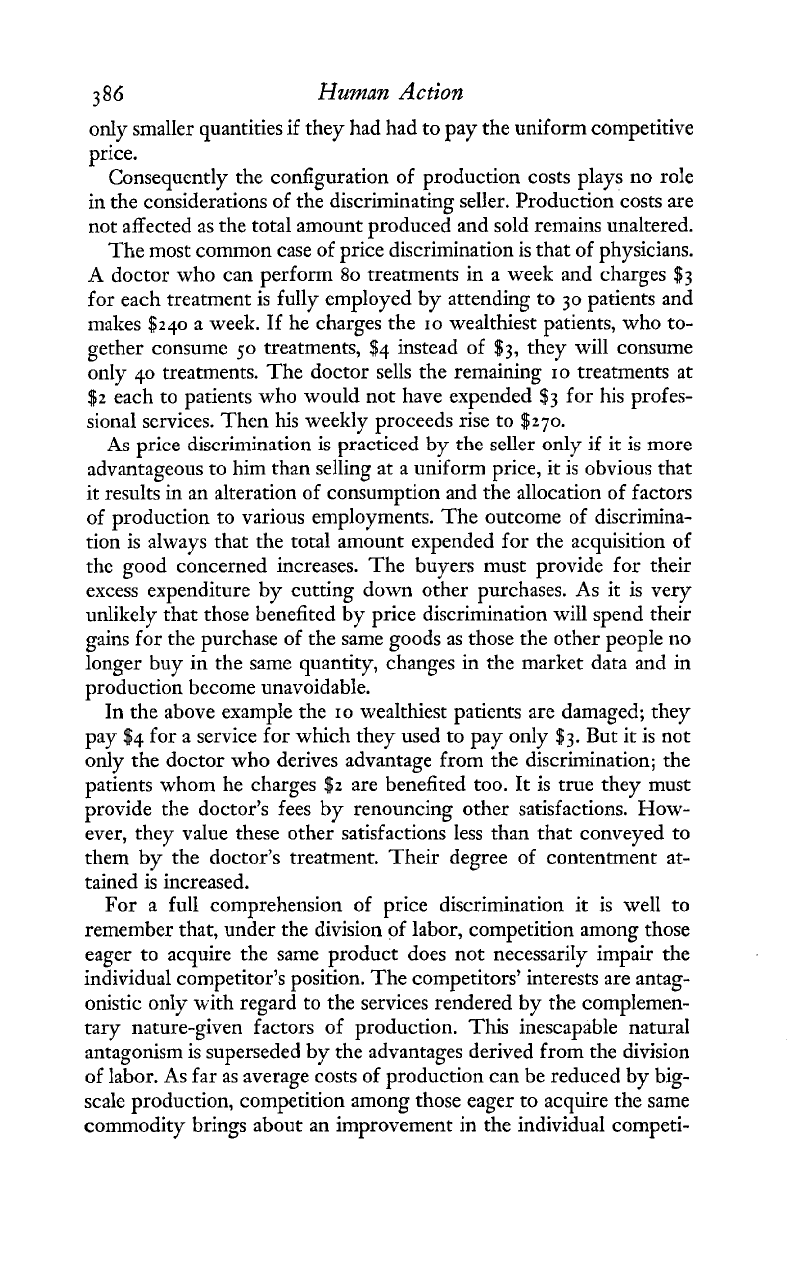
386
Human
Action
only smaller quantities if they had had to pay the uniform competitive
price.
Consequently the configuration of production costs plays no role
in the considerations of the discriminating seller. Production costs are
not affected as the total amount produced and sold remains unaltered.
The most common case of price discrimination is that of physicians.
A doctor who can perform 80 treatments in a week and charges
$3
for each treatment is fully employed by attending to
30
patients and
makes $240 a week.
If
he charges the
10
wealthiest patients, who to-
gether consume 50 treatments, $4 instead of $3, they will consume
only
40
treatments. The doctor sells the remaining
10
treatments at
$2 each to patients who would not have expended
$3
for his profes-
sional services. Then his weekly proceeds rise to $270.
As price discrimination is practiced by the seller only if it is more
advantageous to him than selling at a uniform price, it is obvious that
it results in an alteration of consumption and the allocation of factors
of production to various employments. The outcome of discrimina-
tion is always that the total amount expended for the acquisition of
the good concerned increases. The buyers must provide for their
excess expenditure by cutting down other purchases. As it is very
unlikely that those benefited by price discrimination will spend their
gains for the purchase of the same goods as those the other people no
longer buy in the same quantity, changes in the market data and in
production become unavoidable.
In the above example the
10
wealthiest patients are damaged; they
pay
$4
for a service for which they used to pay only
$3.
But it is not
only the doctor who derives advantage from the discrimination; the
patients whom he charges
$2
are benefited too. It is true they must
provide the doctor's fees by renouncing other satisfactions. How-
ever, they value these other satisfactions less than that conveyed to
them by the doctor's treatment. Their degree of contentment at-
tained is increased.
For a full comprehension of price discrimination it is we11 to
remember that, under the division of labor, competition among those
eager to acquire the same product does not necessariIy impair the
individual competitor's position. The competitors' interests are antag-
onistic only with regard to the services rendered by the complemen-
tary nature-given factors of production. This inescapable natural
antagonism is superseded by the advantages derived from the division
of labor. As far as average costs of production can be reduced by big-
scale production, competition among those eager to acquire the same
commodity brings about an improvement in the individual competi-

Prices
387
tor's situation. The fact that not only a few people but a great number
are eager to acquire the commodity
c
makes it possibIe to manufacture
it in cost-saving processes; then even people with modest means can
afford it. In the same way
it
can sometimes happen that price dis-
crimination renders the satisfaction of a need possible which would
have remained unsatisfied in its absence.
There live
in
a city
p
lovers of music, each of whom would be pre-
pared to spend
$2
for the recital of a virtuoso. But such a concert
requires an expenditure greater than
2
p
dollars and can therefore not
bc arranged. But if discrimination of admission fees is possible and
among the
p
friends of music
n
are ready to spend $4, the recital be-
comes feasible, provided that the amount
2
(n +
#)
dollars is suf-
ficient. Then
n
people spend $4 each and
(p
-
n)
people
$2
each
for the admission and forego the satisfaction of the least urgent need
they would have satisfied if they had not preferred to attend the re-
cital. Each person in the audience fares better than he would have
if the unfeasibility of price discrimination had prevented the per-
formance. It is to the interest of the organizers to enlarge the audience
to
the
point at which thc admission
of
additional customers involves
higher costs than the fees they are ready to spend.
Things would be different if the recital would have been arranged
in spite of the fact that none of those admitted paid more than
$2.
Thcn price discrimination would have impaired the satisfaction of
those who are charged $4.
The most common practices in selling admission tickets for artistic
performances and railroad tickets at different rates are not the out-
come of price discrimination in the catallactical sense of the term.
He who pays a higher rate gets something appreciated more than
he who pays less. He gets a better seat, a more comfortable traveling
opportunity, and so on. Genuine price discrimination is present in the
case of physicians who, although attending to each patient with the
same care, charge the wealthier clients more than the less wealthy. It
is present in the case of railroads charging more for the shipping of
goods the transportation of which adds more to their value than
for others although the costs incurred
by
the railroad are the same.
It is obvious that both the doctor and the railroad can practice dis-
crimination only within the limits fixed by the opportunity given
to the patient and the shipper to find another solution of their prob-
lems more to their own advantage. But this refers to one of the
two
conditions required for the emergence of price discrimination,
It
would be idle to point out a state of affairs in which price dis-
crimination could he practiced by all sellers of all kinds of commodi-
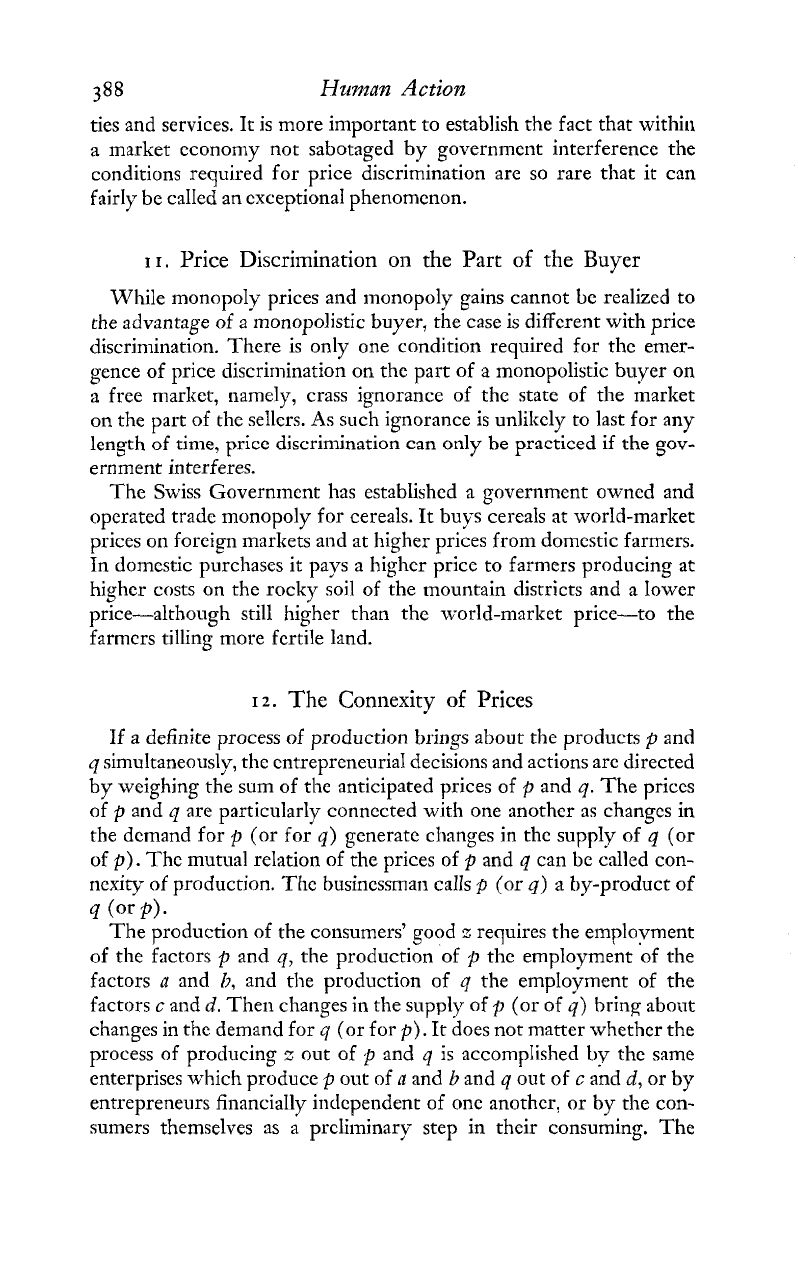
388
Hzrnzan
Action
ties and services. It is more important to establish the fact that within
a
market economy not sabotaged by government interference the
conditions required for price discrimination are so rare that it can
fairly be called an exceptional phenomenon.
I
I.
Price Discrimination on the Part of the Buyer
While monopoly prices and monopoly gains cannot be realized to
the advantage of a monopolistic buyer, the case is different with price
discrimination. There is only one condition required for the emer-
gence of price discrimination on the part of a monopolistic buyer on
a
free market, namely, crass ignorance of the state of the market
on the part of the sellers. As such ignorance is unliltely to last for any
length of time, price discrimination can only be practiced if the gov-
ernment interferes.
The Swiss Government has established a government owned and
operated trade monopoly for cereals. It buys cereals at world-market
prices on foreign markets and at higher prices from domestic farmers.
In domestic purchases it pays a higher pricc to farmers producing at
higher costs on the rocky soil of the tnountain districts and a lower
price-although still higher than the world-marlcet price-to the
farmers tilling more fertile land.
I
z.
The
Csnnexity
of
Prices
If
a
definite process of production brings about the products
p
and
q
simultaneously, the entrepreneuria1 decisions and actions are directed
by weighing the sum of the anticipated prices of
p
and
q.
The prices
of
p
and
q
are particularly connected with one another as changes in
the demand for
p
(or for
q)
generate changes
in
the supply of
q
(or
of
p).
The mutual relation of the prices of
p
and
q
can be called con-
nexity of production. The businessman calls
p
(or
q)
a by-product of
4
(or
P).
The production of the consumers' good
s
requires the emplovment
of the factors
p
and
q,
the production of
p
the employment of the
factors
a
and
b,
and the production of
q
the ernplo$nent of the
factors
c
and
d.
Then changes in the supply of
p
(or of
q)
bring about
changes in the demand for
q
(or for
p).
It does not matter whether the
process of producing
z
out
of
p
and
q
is accompIished
bv
the same
enterprises which produce
p
out of
n
and
b
and q out of
c
and
d,
or by
entrepreneurs financially independent of one another. or by the con-
sumers themselves as a preliminary step in their consuming. The
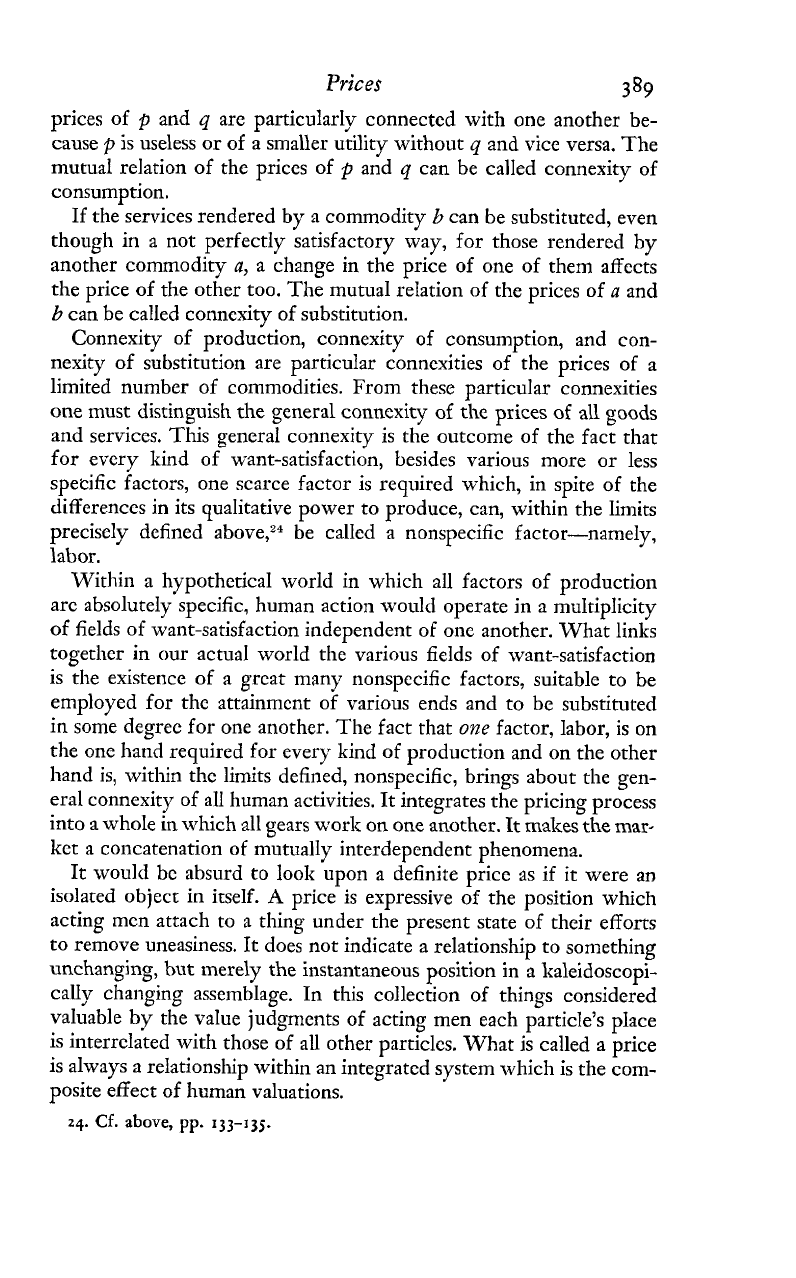
Prices
389
prices of
p
and
q
are particularly connected with one another be-
cause
p
is useless or of a smaller utility without
q
and vice versa. The
mutual relation of the prices of
p
and
q
can be called connexity of
consumption.
If the services rendered
by
a commodity
b
can be substituted, even
though in a not perfectly satisfactory way, for those rendered by
another commodity
a,
a change in the price of one of them affects
the price of the other too. The mutual relation of the prices of
a
and
b
can be called connexity of substitution.
Connexity of production, connexity of consumption, and con-
nexity of substitution are particular connexities of the prices of a
limited number of commodities. From these particular connexities
one must distinguish the general connexity of the prices
of
all
goods
and services. This general connexity is the outcome of the fact that
for every kind of want-satisfaction, besides various more or less
specific factors, one scarce factor is required which, in spite of the
differences in its qualitative power to produce, can, within the limits
precisely defined be called a nonspecific factor-namely,
labor.
Within a hypothetical world in which all factors of production
are absolutely specific, human action would operate in a multiplicity
of fields of want-satisfaction independent of one another. What links
together in our actual world the various fields of want-satisfaction
is the existence of a great many nonspecific factors, suitable to be
employed for the attainment of various ends and to be substituted
in some degree for one another. The fact that
one
factor, labor, is on
the one hand required for every kind of production and on the other
hand is, within the limits defined, nonspecific, brings about the gen-
eral connexity of all human activities. It integrates the pricing process
into
a
whole in which all gears work on one another.
It
makes the mar-
ket a concatenation of mutually interdependent phenomena.
It
would be absurd to look upon a definite price as if it were an
isolated object in itself.
A
price is expressive of the position which
acting men attach to
a
thing under the present state of their efforts
to remove uneasiness. It does not indicate a relationship to something
unchanging, but merely the instantaneous position in a kaleidoscopi-
cally changing assemblage. In this collection of things considered
valuable by the value judgments of acting men each particle's place
is interrelated with those of all other particles. What is called
a
price
is always a relationship within an integrated system which is the com-
posite effect of human valuations.
24.
Cf.
above,
pp.
133-135.
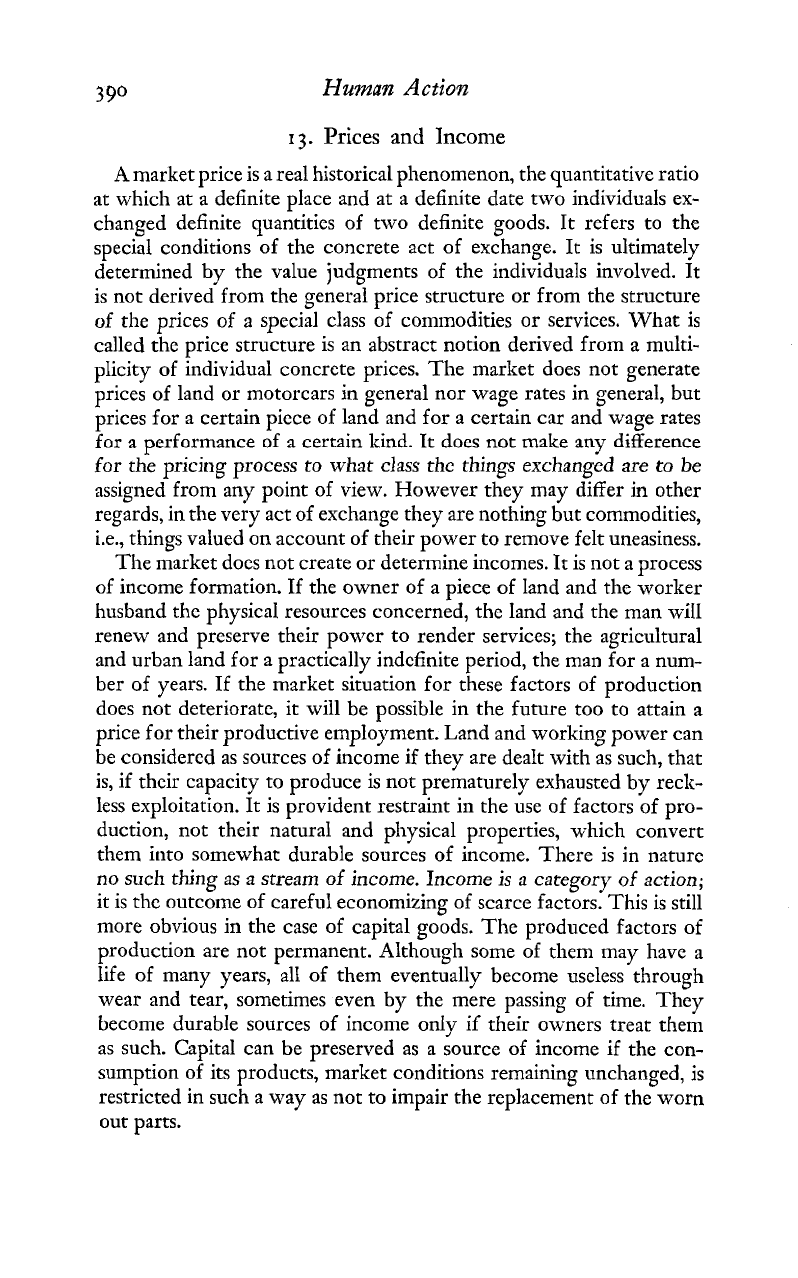
3
90
Human
Action
K
3.
Prices
and
Income
A
market price is a real historical phenomenon, the quantitative ratio
at which at a definite place and at a definite date two individuals ex-
changed definite quantities of two definite goods. It refers to the
special conditions of the concrete act of exchange. It is ultimately
determined by the value judgments of the individuals involved. It
is not derived from the general price structure or from the structure
of the prices of a special class of commodities or services. What is
called the price structure is an abstract notion derived from a multi-
plicity of individual concrete prices. The market does not generate
prices of land or motorcars in general nor wage rates in general, but
prices for a certain piece of land and for a certain car and wage rates
for a performance of a certain kind. It does not make any difference
for the pricing process to what class the things exchanged are
to
be
assigned from any point of view. However they may differ in other
regards, in the very act of exchange they are nothing but commodities,
i.e., things valued on account of their power to remove felt uneasiness.
The market does not create or determine incomes. It is not a process
of income formation. If the owner of a piece of land and the worker
husband the physical resources concerned, the land and the man mi11
renew and preserve their pourer to render services; the agricultural
and urban land for a practically indefinite period, the man for a num-
ber of years. If the market situation for these factors of production
does not deteriorate, it will be possible in the future too to attain a
price for their productive employment. Land and working power can
be considered as sources of income if they are deaIt with as such, that
is, if their capacity to produce is not prematurely exhausted by reck-
less exploitation. It is provident restraint in the use of factors of pro-
duction, not their natural and physical properties, which convert
them into somewhat durable sources of income. There is in nature
no such thing as a stream
of
income. Income is a category
of
action;
it is the outcome of careful economizing of scarce factors. This is still
more obvious in the case of capital goods. The produced factors of
production are not permanent. Although some of them may have a
life of many years, all of them eventually become uscless through
wear and tear, sometimes even by the mere passing of time. They
become durable sources of income only if their owners treat them
as such. Capital can be preserved as a source of income if the con-
sumption of its products, market conditions remaining unchanged, is
restricted in such a way as not to impair the replacement of the worn
out parts.
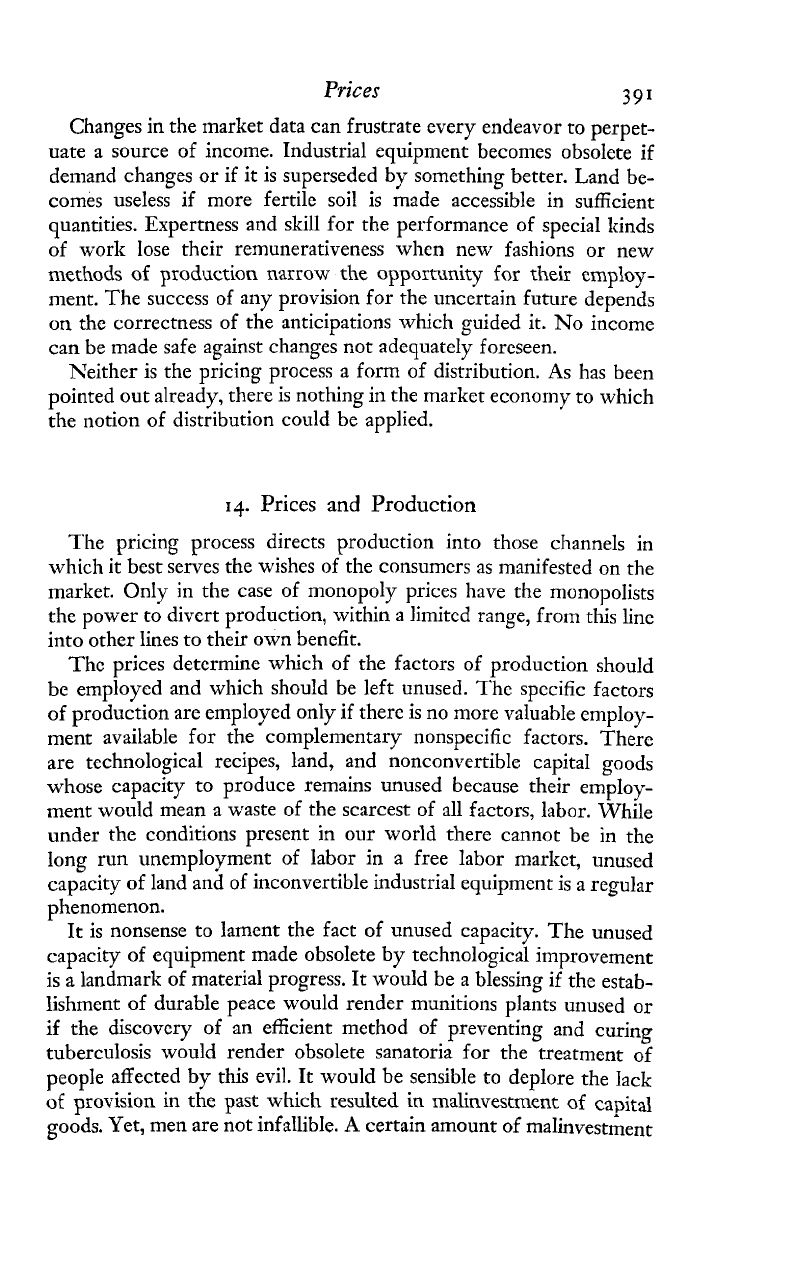
Prices
391
Changes in the market data can frustrate every endeavor to perpet-
uate a source of income. Industrial equipment becomes obsolete if
demand changes or if it is superseded by something better. Land be-
comes useless if more fertile soil is made accessible in sufficient
quantities. Expertness and skill for the performance of special kinds
of work lose their remunerativeness when new fashions or new
methods
of
production narrow the opportunity
for
their employ-
ment. The success of any provision for the uncertain future depends
on the correctness of the anticipations which guided it. No income
can be made safe against changes not adequately foreseen.
hTeither is the pricing process a form of distribution. As has been
pointed out already, there is nothing in the market economy to which
the notion of distribution could be applied.
14.
Prices
and Production
The pricing process directs production into those channels in
which it best serves the wishes of the
consumers
as manifested on the
market. Only in the case of monopoly prices have the monopolists
the power to divert production, within a limited range, from this line
into other lines to their own benefit.
The prices detcrminc which of the factors of production should
be employed and which should be left unused. 'She spccific factors
of poduction are employed only if there is no more valuable employ-
ment available for the complementary nonspecific factors. There
are technological recipes, land, and nonconvertible capital goods
whose capacity to produce remains unused because their employ-
ment would mean a waste of the scarcest of all factors, labor. While
under the conditions present in our world there cannot be in the
long run unemployment of labor in a free labor market, unused
capacity of land and of inconvertible industrial equipment is a regular
phenomenon.
It is nonsense to lament the fact of unused capacity. The unused
capacity of equipment made obsolete by technological improvement
is
a
landmark of material progress. It would be a blessing if the estab-
lishment of durable peace would render munitions plants unused or
if the discovery of an efficient method of preventing and curing
tuberculosis would render obsolete sanatoria for the treatment of
people affected by this evil. It would be sensible to deplore the lack
of provision in the past which resulted
in
malinvestmcnt
of
capital
goods. Yet, men are not infallible. A certain amount of malinves&ent
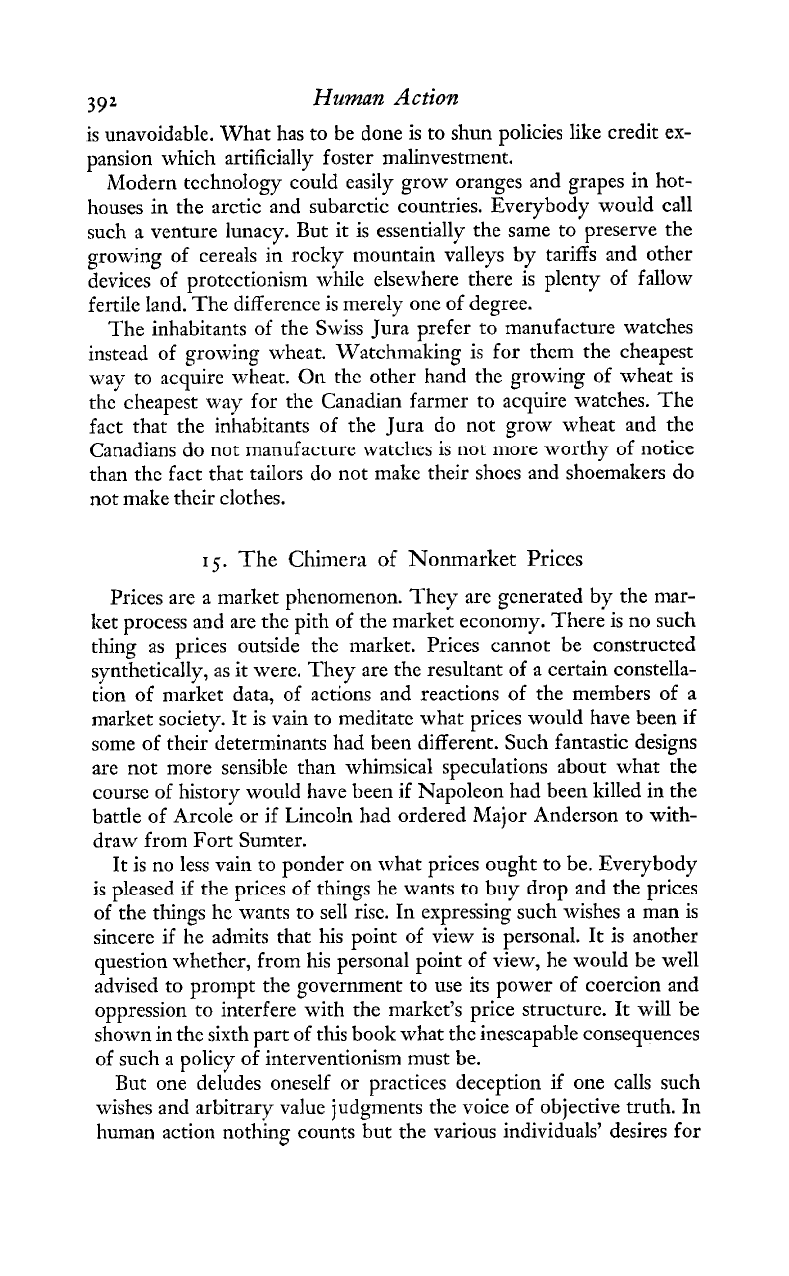
392
Human
Action
is unavoidable. What has to be done is to shun policies like credit ex-
pansion which artificially foster malinvestment.
Modern technology could easily grow oranges and grapes in hot-
houses in the arctic and subarctic countries. Everybody would call
such a venture lunacy. But it is essentially the same to preserve the
growing of cereals in rocky mountain valleys by tariffs and other
devices of protectionism while elsewhere there is plenty of fallow
fertile land. The difference is merely one of degree.
The inhabitants of the Swiss Jura prefer to manufacture watches
instead of growing wheat. Watchmaking is for them the cheapest
way to acquire wheat.
On
the other hand the growing of wheat is
the cheapest way for the Canadian farmer to acquire watches. The
fact that the inhabitants of the Jura do not grow wheat and the
Canadians do
not
manufacture watches is not more worthy of notice
than the fact that tailors do not make their shoes and shoemakers do
not make their clothes.
15.
The Chimera
of
Nonmarket Prices
Prices are a market phenomenon. They arc generated by the mar-
ket process and are the pith of the market economy. There is no such
thing as prices outside the market. Prices cannot
be
constructed
synthetically, as it were. They are the resultant of a certain constella-
tion of market data, of actions and reactions of the members of
a
market society. It is vain to meditate what prices would have been if
some of their determinants had been different. Such fantastic designs
are not more sensible than whimsical speculations about what the
course of history would have been if Napoleon had been killed in the
battle of Arcole or if Lincoln had ordered Major Anderson to with-
draw from Fort Sumter.
It is no less vain to ponder on what prices ought to be. Everybody
ic
nlensed
if
the
price5
of things
he
wants to huy drop and the prices
--
r-----
of the things he wants to selI rise.
In
expressing such wishes a man is
sincere if he admits that his point of view is personal. It is another
question whether, from his personal point of view, he would be well
advised to prompt the government to use its power
of
coercion and
oppression to interfere with the market's price structure. It will be
shown in the sixth part of this book what the inescapable consequences
of such a policy of interventionism must be.
But one deludes oneself or practices deception if one calls such
wishes and arbitrary value judgments the voice of objective truth. In
human action nothhg counts but the various individuals' desires for
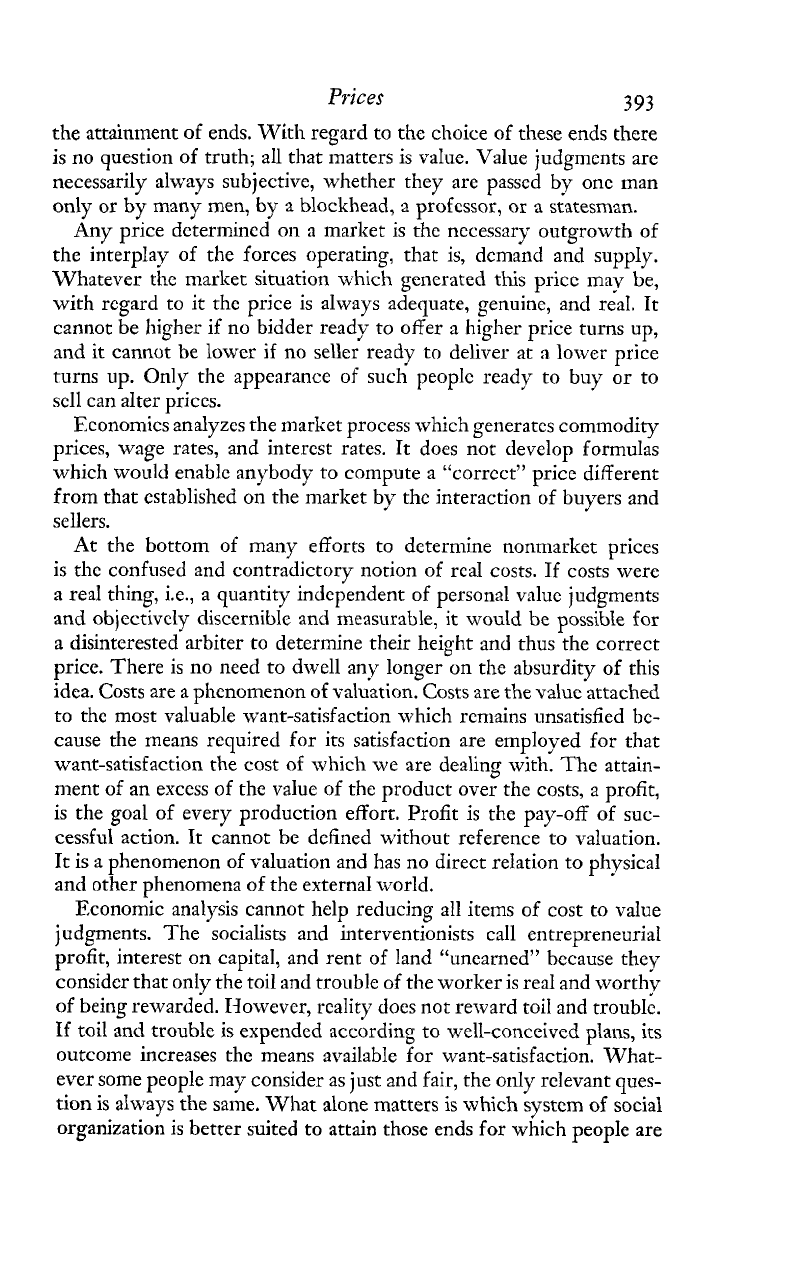
the attainment of ends. With regard to the choice of these ends there
is no question of truth; all that matters is value. Value judgments are
necessarily always subjective, whether they are passed by one man
only or by many men, by a blockhead, a professor, or a statesman.
Any price determined on a market is the necessary outgrowth of
the interplay of the forces operating, that is, demand and suppIy.
Whatever the market situation which generated this price may be,
with regard to it the price is always adequate, genuine, and real. It
cannot be higher if no bidder ready to offer a higher price turns up,
and it cannot be lower if no seller ready to deliver at
a
lower price
turns up. Only the appearance of such people ready to buy or to
sell can alter prices.
Economics analyzes the market process which generates commodity
prices, wage rates, and interest rates. It does nor develop formulas
which would enable anybody to compute a "correct" price different
from that established on the market by the interaction of buyers and
sellers.
At
the bottom of many efforts to determine nonnlarket prices
is the confused and contradictory notion of real costs. If costs were
a real thing, i.e., a quantity independent of personal valuc judgments
and objectively discernible and measurable, it would be possible
for
a disinterested'arbiter to determine their height and thus the correct
price. There is no need to dwell any longer on the absurdity of rhis
idea. Costs are a phenomenon of valuation. Costs are the valuc attached
to the most valuable want-satisfaction which remains unsatisfied be-
cause the means required for its satisfaction are employed for that
want-satisfaction the cost of which we are dealing with. The attain-
ment of an excess of the value of the product over the costs, a profit,
is the goal of every production effort. Profit is the pay-off of suc-
cessful action. It cannot be defined without reference to valuation.
It is a phenomenon of valuation and has no direct reIation to physical
and other phenomena of the external world.
Economic analysis cannot help reducing all items of cost to value
judgments. The socialists and interventionists call entrepreneurial
profit, interest on capital, and rent of land "unearned" because they
consider that only the toil and trouble of the worker is real and worthy
of being rewarded. I3owever, reality does not reward toil and trouble.
If
toil and trouble is expended according to
well-conceived
plans,
its
outcome increases the means available for want-satisfaction. What-
ever some people may consider as just and fair, the only relevant ques-
tion is always the same. What alone matters is which system of social
organization is better suited to attain those ends for which people are
